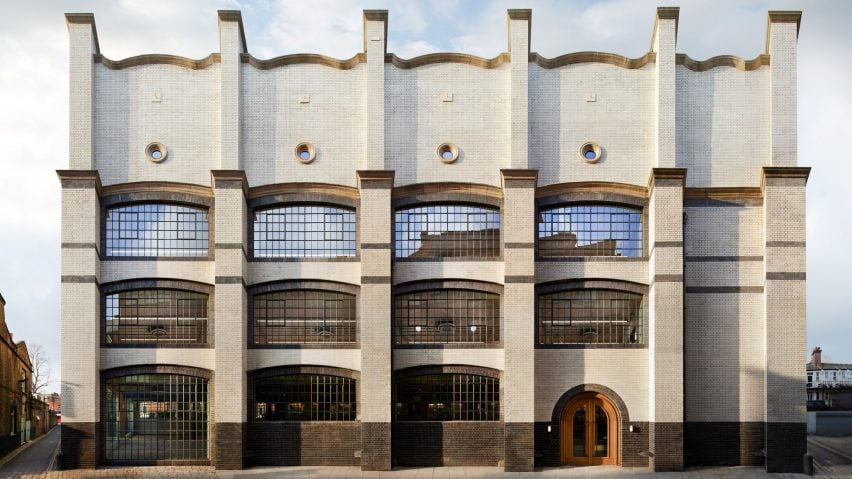Architecture studio dMFK Architects has restored and renovated the Voysey House office in Chiswick, London, which was originally designed as a wallpaper factory by architect CFA Voysey.
The studio renovated the Grade-II listed building – the only factory designed by the architect – into a "premium workspace" for property developer Dorrington. It will be occupied by wallpaper company Sanderson Design Group, which originally commissioned the building as an extension to its main factory more than a century ago.
The team aimed to revive the structure's original character reversing a series of renovations over the past 100 years following its conversion into offices after a fire in 1928.
Built with white glazed bricks, painted Staffordshire blue bricks and Portland stone, the building has a striking facade that was carefully repaired to its "former glory". This included replacing the non-original windows with steel reproductions of the original frames.
"The main concept for the project was to deliver a holistic restoration that refocuses attention on the quality of CFA Voysey's original building," dMFK Architects director Joshua Scott told Dezeen.
"We've embraced the opportunity to unravel the story of the Voysey House, which had lost its way after being subjected to a series of functional changes over the past century that significantly diluted its impact."
The studio reorganised the building's layout with a four-metre-high wallpaper showroom placed on the ground floor, which had contained a garage and entrance lobby.
Throughout, dMFK Architects aimed to draw attention to the building's original structure including its iron columns and shallow, barrel-vaulted concrete ceilings enclosed in corrugated iron shuttering.
New doors and joinery added throughout the interior also reference original detailing by Voysey, while Staffordshire blue quarry tiles were used on some floors and to line the main staircase.
"Whilst retaining the original bones and structure of the building, we've introduced new elements to create a modern and sustainable workplace that pays homage to Voysey's original design," said Dorrington head of development and regeneration Bruce Thompson.
Office spaces occupy the first, second and fourth floors and are lit by an internal light-well, with large openings leading out to terraces. A historic archive is hosted on the third floor.
Oxidised copper cladding was used to wrap around the light-well and is complemented by metal railings and window frames coloured in "Voysey bottle green" chosen to pay homage to the original paintwork.
In restoring the historic factory, the building's U-Value has been reduced by more than 50 per cent along with it achieving an EPC rating of A, according to the studios.
"The non-original existing windows were replaced with ultra-thin 7.7mm double glazing set within steel reproductions of the original frames," Scott said.
"These look like they've always been there to a passerby, but they're brand new – a change which has vastly improved Voysey House's energy efficiency."
Voysey was a British Arts and Crafts architect and designer who was awarded the RIBA Gold Medal in 1940. Voysey House stands as the only commercial building designed by the renowned architect. Recently, Voysey's Winsford Cottage Hospital in Devon was converted into a holiday home by Benjamin + Beauchamp Architects.
Elsewhere, other restorations of historic buildings include the renovation of the Grand Palais by Chatillon Architectes which is set to host olympic games in Paris and the reconstruction of the Notre-Dame cathedral's spire following a devastating fire in 2019.
The photography is by Jack Hobhouse.
Project credits:
Architect: dMFK Architects
Client: Dorrington
Occupier: Sanderson Design Group
Main contractor: Ambit
Heritage and planning advisors: Turley
Structural engineer: Heyne Tillett Steel
MEP engineer: DSA Engineering
Fire engineer: Trigon Fire
Steel windows specialist: West Leigh
Brick specialist: Paye
Project manager: Pillar
Quantity surveyor: CHP

